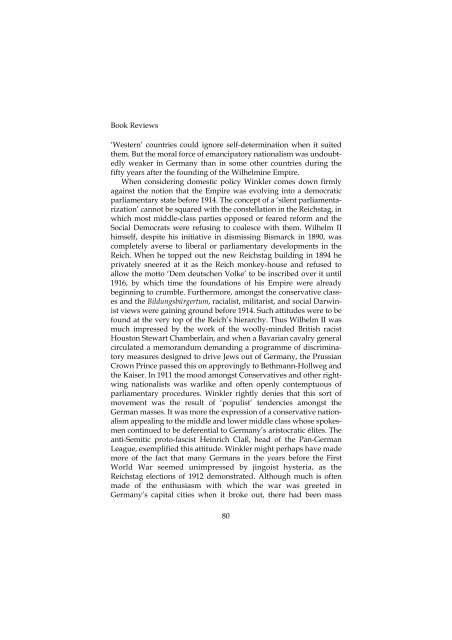Download - German Historical Institute London
Download - German Historical Institute London
Download - German Historical Institute London
You also want an ePaper? Increase the reach of your titles
YUMPU automatically turns print PDFs into web optimized ePapers that Google loves.
Book Reviews<br />
‘Western’ countries could ignore self-determination when it suited<br />
them. But the moral force of emancipatory nationalism was undoubtedly<br />
weaker in <strong>German</strong>y than in some other countries during the<br />
fifty years after the founding of the Wilhelmine Empire.<br />
When considering domestic policy Winkler comes down firmly<br />
against the notion that the Empire was evolving into a democratic<br />
parliamentary state before 1914. The concept of a ‘silent parliamentarization’<br />
cannot be squared with the constellation in the Reichstag, in<br />
which most middle-class parties opposed or feared reform and the<br />
Social Democrats were refusing to coalesce with them. Wilhelm II<br />
himself, despite his initiative in dismissing Bismarck in 1890, was<br />
completely averse to liberal or parliamentary developments in the<br />
Reich. When he topped out the new Reichstag building in 1894 he<br />
privately sneered at it as the Reich monkey-house and refused to<br />
allow the motto ‘Dem deutschen Volke’ to be inscribed over it until<br />
1916, by which time the foundations of his Empire were already<br />
beginning to crumble. �urthermore, amongst the conservative classes<br />
and the Bildungsbürgertum, racialist, militarist, and social Darwinist<br />
views were gaining ground before 1914. Such attitudes were to be<br />
found at the very top of the Reich’s hierarchy. Thus Wilhelm II was<br />
much impressed by the work of the woolly-minded British racist<br />
Houston Stewart Chamberlain, and when a Bavarian cavalry general<br />
circulated a memorandum demanding a programme of discriminatory<br />
measures designed to drive Jews out of <strong>German</strong>y, the Prussian<br />
Crown Prince passed this on approvingly to Bethmann-Hollweg and<br />
the Kaiser. In 1911 the mood amongst Conservatives and other rightwing<br />
nationalists was warlike and often openly contemptuous of<br />
parliamentary procedures. Winkler rightly denies that this sort of<br />
movement was the result of ‘populist’ tendencies amongst the<br />
<strong>German</strong> masses. It was more the expression of a conservative nationalism<br />
appealing to the middle and lower middle class whose spokesmen<br />
continued to be deferential to <strong>German</strong>y’s aristocratic élites. The<br />
anti-Semitic proto-fascist Heinrich Claß, head of the Pan-<strong>German</strong><br />
League, exemplified this attitude. Winkler might perhaps have made<br />
more of the fact that many <strong>German</strong>s in the years before the �irst<br />
World War seemed unimpressed by jingoist hysteria, as the<br />
Reichstag elections of 1912 demonstrated. Although much is often<br />
made of the enthusiasm with which the war was greeted in<br />
<strong>German</strong>y’s capital cities when it broke out, there had been mass<br />
80













